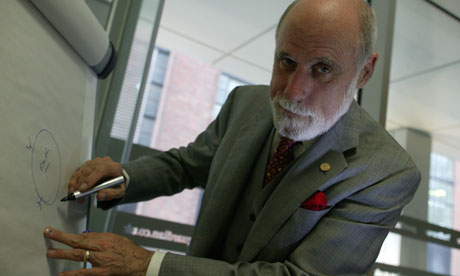
Vint Cerf is widely acclaimed as the 'father of the internet'. Photograph: Frank Baron for the Guardian
Europe will run out of capacity for new internet addresses by early next year, potentially cutting the UK off from the rest of the world online, one of the founding fathers of the communications network warned today.
Vint Cerf, vice-president of Google and the man dubbed "the godfather of the net", said the shortage of internet address space represented a "serious boundary" to the growth of the medium.
Cerf added that the problem is one of the "biggest set of changes in the history of the internet".
Online access across Europe will remain fixed at its current rate unless internet service providers (ISPs) move quickly to implement new internet protocol (IP) space, the leading computer scientist warned.
Most of the internet in Europe is based on IP addresses standardised in 1996, known as IPv4.
IPv4 has space for 4bn internet addresses, whereas the new IPv6 can host "340 trillion, trillion, trillion" addresses, Cerf said. "So the theory is we won't run out, at least not until after I'm dead."
But space for IPv4 addresses is running out, with the remaining 4% expected to be exhausted by spring next year. Cerf joined the new UK-based campaign group 6UK in urging businesses to adopt the next generation of IP addresses, known as IPv6, as soon as possible.
"There's no question we're going to be out of address space by springtime of 2011," Cerf said.
He added that this was a "serious boundary" to online growth that should be removed. "If nobody does anything then the internet will simply stop expanding," he said, comparing the situation to selling telephones without telephone numbers.
"You need to be able to talk to everyone in the world [who] is on the internet. If Europe doesn't implement IPv6, it wont be able to talk to the rest of the world that does implement IPv6 – that's stupid, and we don't want people here to be stupid," he said.
The 67-year-old computer scientist, who helped build the internet while working as a researcher at Stanford University in California, issued the ultimatum ahead of the launch of 6UK, a UK-based campaign group to promote the adoption of the new internet protocol, in London today.
"The biggest set of changes in the history of the internet are happening today," he said. "The change in the address space, the change in domain name languages, the introduction of digital signatures in the domain name system, the introduction of end-to-end cryptography in accessing internet-based services. This is a huge change in the net."








0 comentarios:
Post a Comment